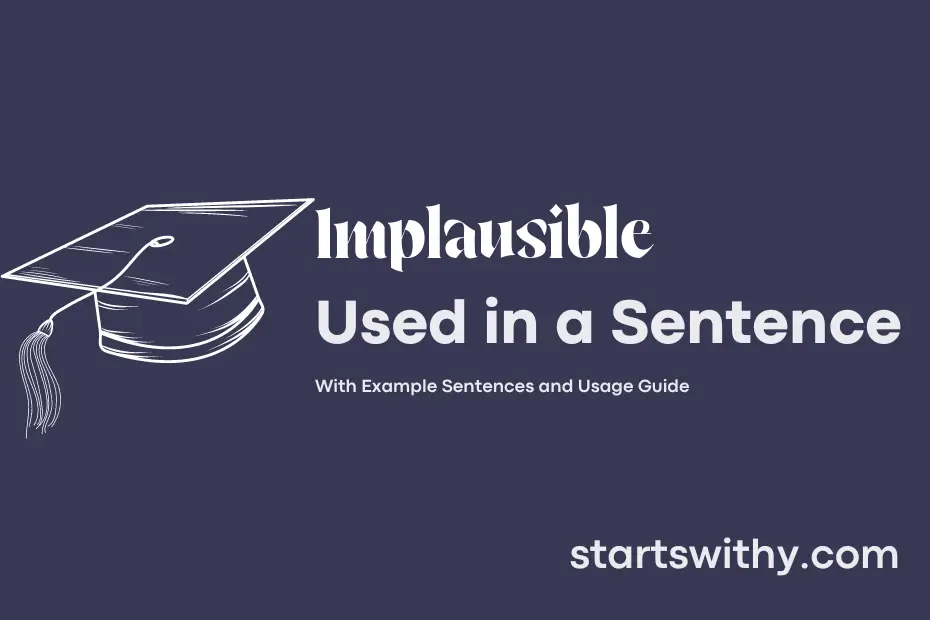Have you ever encountered a story or situation that seemed completely unbelievable or unlikely? This type of scenario falls under the category of “implausible,” meaning something that is difficult to believe or far-fetched.
An implausible event or statement can stretch the boundaries of credibility, often challenging the reader or listener to suspend their disbelief. It is a term used to describe situations that are so unlikely, they may seem almost impossible.
7 Examples Of Implausible Used In a Sentence For Kids
- The monkey flying in the sky is implausible.
- A talking tree is implausible.
- An elephant riding a bicycle is implausible.
- A fish flying in the air is implausible.
- A cat dancing on its tail is implausible.
- A house made of chocolate is implausible.
- A lion wearing glasses is implausible.
14 Sentences with Implausible Examples
- Getting a perfect score on every test without studying is implausible.
- Expecting to finish an assignment the night before it’s due without any prior research is implausible.
- Asking for a deadline extension on the day of submission because of a sudden illness seems implausible.
- Believing that all professors will overlook late submissions is implausible.
- Planning to pass an exam without attending any lectures or tutorials is implausible.
- Assuming that all group project members will do their fair share of work without any reminders is implausible.
- Thinking that all notes and study materials can be absorbed by just glancing at them once is implausible.
- Expecting to receive good grades without putting in effort is implausible.
- Relying solely on last-minute cramming to ace an exam is implausible.
- Believing that all professors will accept excuses for missing classes frequently is implausible.
- Hoping to successfully write a research paper without citing any sources is implausible.
- Thinking that one can excel in academics without actively participating in class discussions is implausible.
- Planning a flawless college life without facing any challenges or setbacks is implausible.
- Assuming that all classmates will share accurate study materials without any discrepancies is implausible.
How To Use Implausible in Sentences?
To use the word Implausible in a sentence, follow these simple steps:
-
Understand the meaning of Implausible – This word refers to something that is unlikely or not believable. For example, if a story is Implausible, it means it is far-fetched or doesn’t seem realistic.
-
Identify a context – Think of a situation where you want to describe something as not believable or unrealistic. This could be a plot in a movie, an excuse given by someone, or a statement that seems too improbable.
-
Construct your sentence – Once you have your context, frame your sentence using Implausible appropriately. For example, “The detective found the suspect’s alibi to be Implausible due to conflicting details.”
-
Check for accuracy – Make sure that the usage of Implausible fits the context of your sentence and accurately conveys the meaning of something that is not credible or believable.
-
Practice – Try using Implausible in different sentences to become more familiar with its usage. The more you practice, the more comfortable you will be incorporating it into your vocabulary.
By following these steps, you can effectively incorporate the word Implausible into your writing and conversations, adding depth and nuance to your communication.
Conclusion
In conclusion, sentences with implausible scenarios are often characterized by their lack of believability or coherence within a story. These sentences stretch the bounds of reality to a point where readers find them difficult to accept or envision as possible occurrences. The implausibility of such sentences can detract from the overall credibility and enjoyability of a narrative, leading to confusion or disconnection for the audience.
To enhance the quality of writing and maintain reader engagement, it is crucial to ensure that sentences with implausible content are avoided or revised to align more closely with the plausible elements of the story. By crafting sentences grounded in realism and logic, authors can create a more immersive and satisfying reading experience for their audience.



